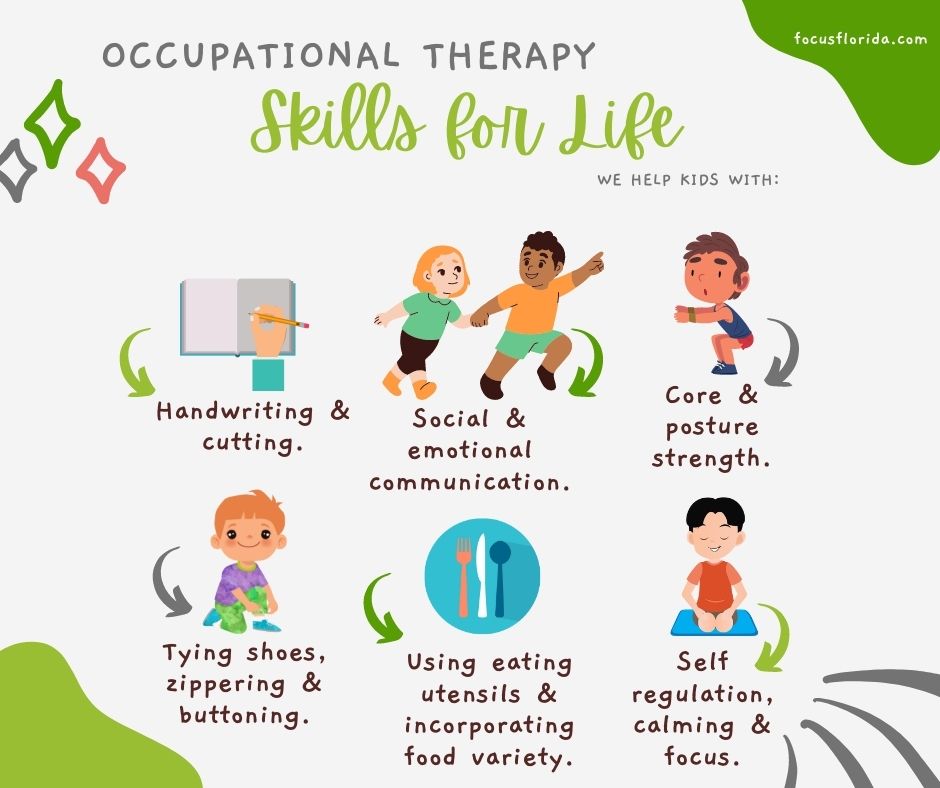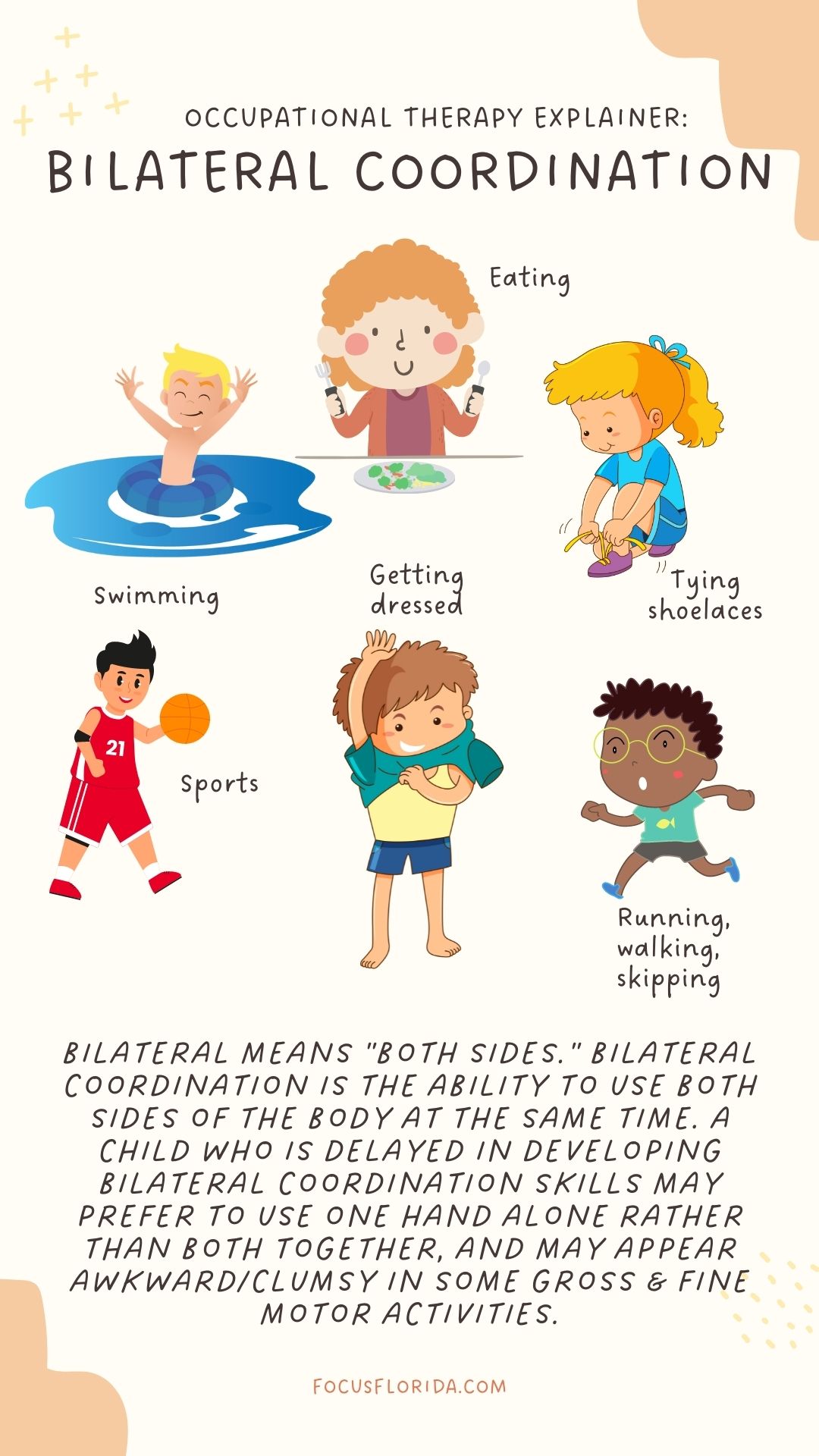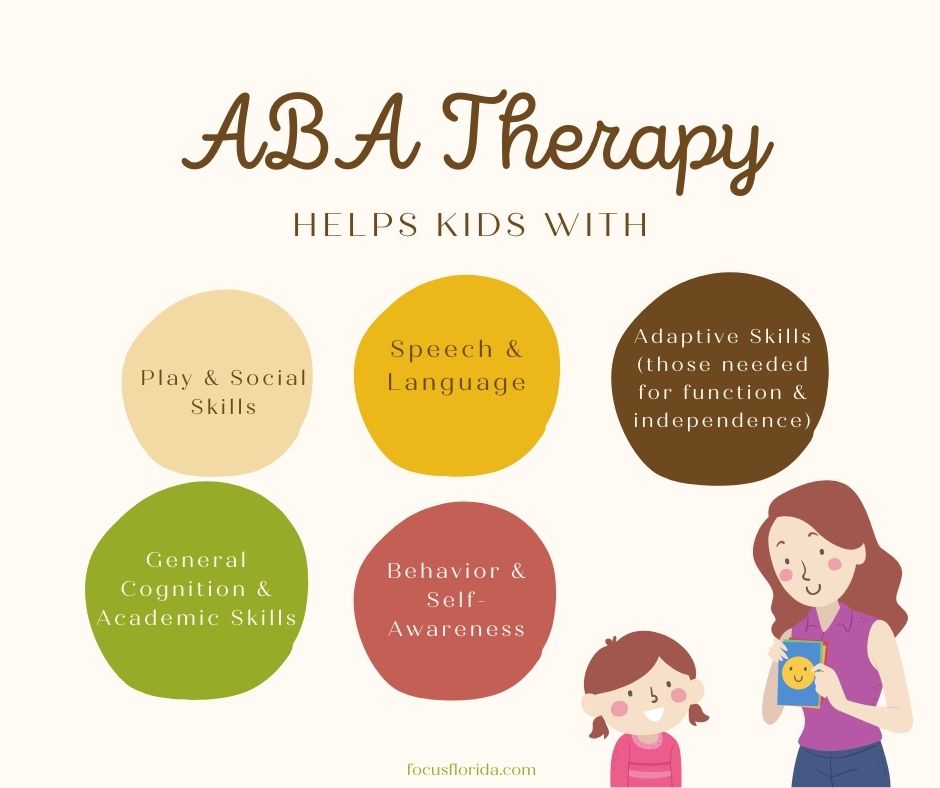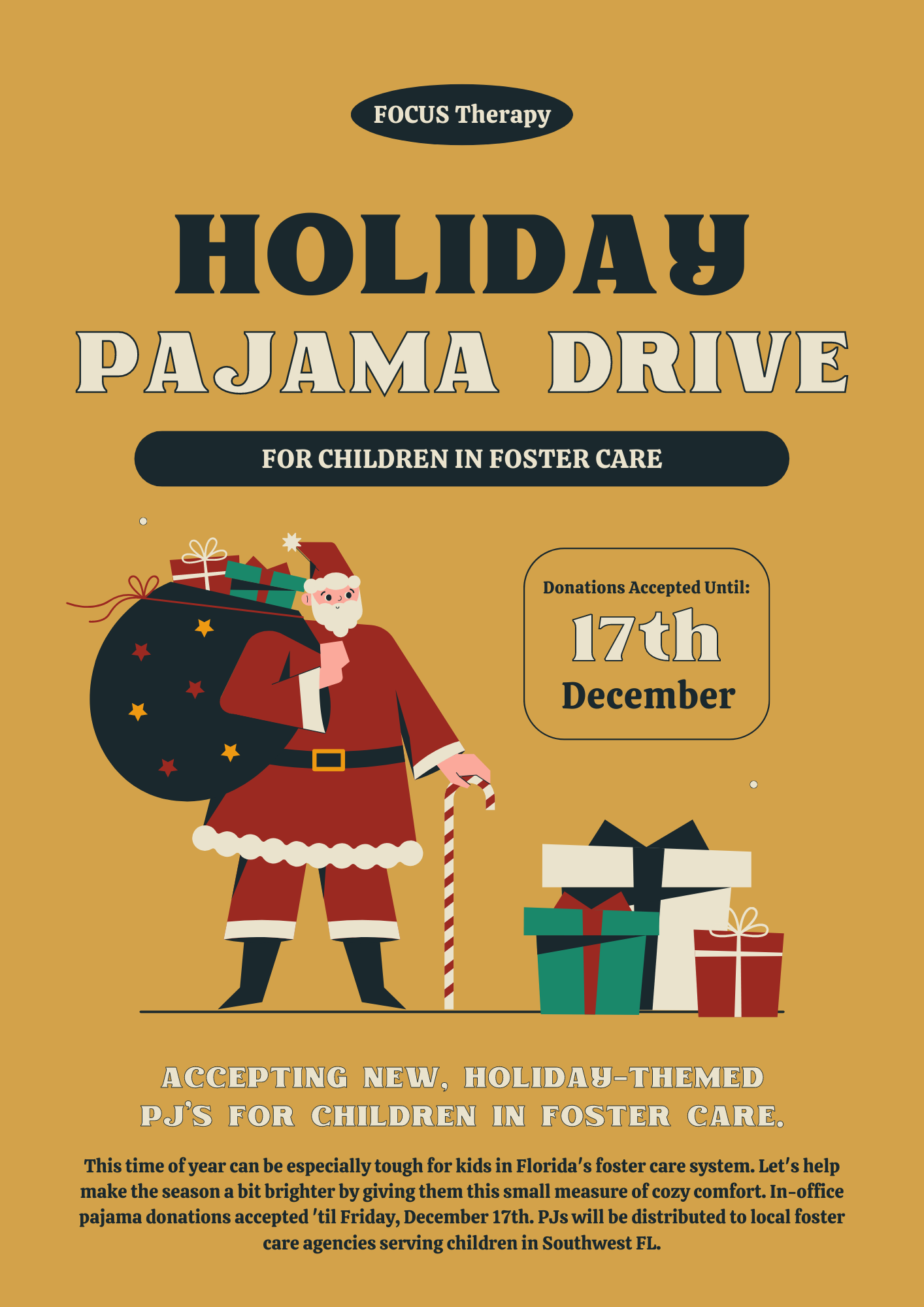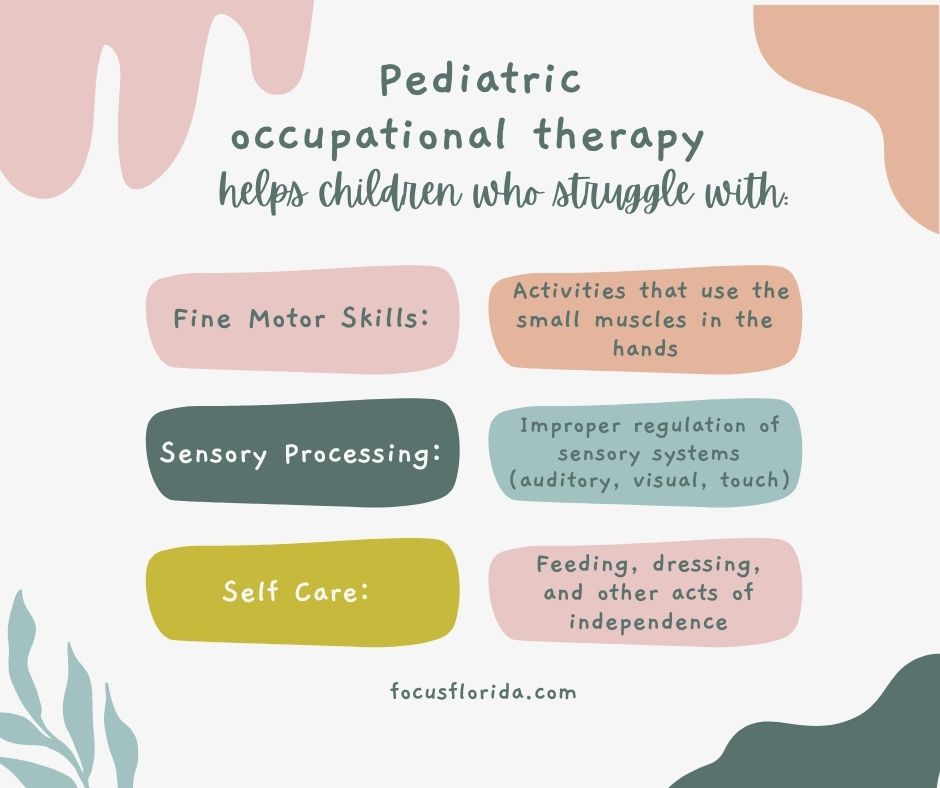Blog
How Fort Myers Occupational Therapy Helps Kids
Occupational therapy is a broad discipline. Some parents are confused when they’re referred to “OT” by their child’s pediatrician. After all, the first thing that comes to mind when we think “occupation” is “job.” And kids don’t have jobs… Right?
In fact, children are tasked with a dizzying number of important jobs, spanning far beyond just learning to talk and walk (which in themselves can be pretty daunting milestones, especially for children with certain delays, disorders, and different abilities).
Occupational therapists – particularly those who work in pediatrics (with kids) – are responsible to:
- Identify the developmental/functional deficits with which a child struggles.
- Develop an evidence-based plan of care that specifically outlines the goals for each individual child on a personalized timeline.
- Use each OT session to creatively to help kids “play their way” to achieving those goals.
A pediatric OT session may look a lot like goofing off (another reason the field – and its necessity – are met with confusion). But the play-based approach is deliberate. You know the saying, “Time flies when you’re having fun”? Play is what keeps kids engaged and interested, motivated and willing to push themselves just a bit harder every time. The most effective occupational therapy sessions are those that don’t feel like work at all for the child. This is rooted in mountains of evidence showing that it works.
- Categorized: Occupational Therapy
- Tagged: Florida virtual occupational therapy, Fort Myers OT kids, Lee County occupational therapy, occupational therapy, ot, pediatric occupational therapy, pediatric OT Fort Myers, South Florida occupational therapy, Southwest Florida, Southwest Florida OT kids, teletherapy OT, virtual occupational therapy kids
How Behavior Chaining Works in ABA Therapy
ABA therapy, short for applied behavior analysis or behavior therapy, focuses on studying behaviors – understanding them – and then incorporating techniques that promote expected behaviors and modify unexpected behaviors. One of the strategies our Fort Myers ABA therapy team employs is called “chaining.”
Chaining is a type of evidence-based technique that we can use to teach kids basic skills like handwashing or waiting their turn to more independent life skills.
The basic idea is that you’re breaking down each task into a series of mini-tasks. Many of us take for granted that skills like using the restroom or engaging in a conversation require numerous steps. We don’t give a second thought to every single step needed to complete everyday tasks – but there are, in fact, many. It takes some kids with developmental delays and disorders lots of practice to master each individual step.
Let’s take handwashing, for instance. It’s considered a single, simple task. But in ABA therapy, we recognize that there are many smaller steps to it. We break it down into little, teachable bits. These include:
- Turning on the sink.
- Adjusting the water temperature.
- Getting your hands wet.
- Pressing the soap dispenser (or grabbing the soap).
- Moving the soap around in your hands.
- Scrubbing your hands.
- Rinsing off the soap.
- Turning off the water.
- Drying your hands.
We teach this series of tasks as one “behavior chain.” Once they have the first step down, we move onto the next step in the behavior chain. As the child gets comfortable with each “mini-task,” we add or “chain” new behaviors/tasks that are linked to it, so that it all becomes synched. The child learns what is expected – and what is not expected – as they move through the steps of each task.
How We Use Storytelling in Fort Myers Speech Therapy
From fables and fairytales to silly rhymes and serious plots, kids LOVE story time! At its core, storytelling is about connection and communication. Everyone has a story to tell, and stories help us to understand the world around us and empathize with the people in it. Being able to follow – and tell – a story helps to understand the actions and opinions of others, and allows others to understand us too. Stories can be poignant and meaningful, giving us insight into an important life lessons, or they can be simple, everyday conversations, such as what someone did that weekend. When children learn how to tell stories, they learn how to be better communicators. At our FOCUS Fort Myers speech therapy clinic, we love using creative stories in sessions. It not only teaches children important communication skills, it keeps them interested and engaged!
Teaching storytelling involves not just reading stories, but breaking them down into the most basic parts for kids to understand. In our experience with young children, it’s best to start with simple narrative stories and then help them to identify the beginning, middle, and end. We teach them the transition words (first, then, next, last…). Even if retelling the story is difficult, sparse, or choppy at first, the idea is to help ensure the retelling isn’t random – it’s an organized beginning-middle-end structure.
For instance, we’d tell the story of the Three Little Pigs like this:
- First, three little pigs built three houses.
- Then, a big, bad wolf said he would blow their houses down.
- Finally, the three pigs found safety in the house made of bricks.
Once they’ve mastered this basic Beginning, Middle, End, we can help them work on the more complicated story structures, such as orientation/setting (answering the who, where and when questions), the complication/plot (answering the what questions), the action (this answers the what and also how), the resolution (also the what and how questions) and the ending.
No doubt these are skills your child will need in school. The sooner we begin working on it when they’re younger, the better.
- Categorized: Speech Therapy
- Tagged: Cape Coral speech therapy, Estero speech therapy, Fort Myers child speech therapy, Fort Myers speech therapist, Fort Myers speech therapy, Lehigh Acres speech therapy, Southwest Florida speech therapy, speech therapist, speech therapy, speech therapy kids Lee County, speech therapy kids SWFL
Bilateral Coordination, Explained by Fort Myers Pediatric Occupational Therapists
Bilateral coordination, sometimes referred to as bilateral integration, is a critical developmental skill with which some kids struggle. It involves using both sides of the body together, and can impact both fine and gross motor skills Children who have difficulty with bilateral coordination may be diagnosed solely with developmental coordination disorder, but it’s also closely associated with other conditions such as autism spectrum disorder, Down syndrome, cerebral palsy and other developmental delays and disorders.
As Fort Myers pediatric occupational therapists, we recognize there’s been an increasing awareness about what bilateral coordination is as well as what deficits might look like. A reported uptick in bilateral coordination deficits could also be partially attributed to COVID closures, as lots of kids lacked regular exposure to certain activities (PE class, playground time, etc.) that can help build these skills.
How Do I Know If My Child Has Poor Bilateral Coordination?
Some indicators of poor bilateral coordination include:
- Trouble cutting with scissors.
- Struggles with handwriting.
- Difficulty tying shoes.
- Having a hard time dressing themselves (pulling on socks, pants, and shoes).
- Trouble with fasteners, like buttons, zips, or snaps.
- Clumsy movements.
- Trouble catching a ball.
- Awkward clapping.
- Troubling using a bicycle pedal.
Parents should note there are actually three different types of bilateral coordination: Symmetrical, reciprocal and leading/supporting.
How ABA Therapy Can Help Fort Myers Kids
- focustherapy
- Dec 27, 2021
- Comments: ( 1 )
ABA therapy (short for applied behavioral analysis) is an evidence-based therapy that focuses on studying the “ABCs” of behavior to learn the function of it. From there, we can use positive reinforcement to create an environment that helps promote expected behaviors and minimize unexpected behaviors, We start with A, the antecedent, (what comes before the behavior), then B, the behavior itself, and then C, the consequence (what comes right after the behavior).
All behavior has a function. At its core, behavior is a means of communication. We work to understand what the child is gleaning from the behavior (avoidance? sensory input? a reaction?). We also find out what really interests or motivates them. We then use scientifically-proven strategies that will help us tailor a unique treatment plan to promote helpful behaviors and fade/extinct unhelpful behaviors.
When ABA therapy is successful, it can help with skills key to independent function. Learn more about FOCUS Fort Myers ABA Therapy services here.
FOCUS offers pediatric behavior therapy, occupational therapy, speech therapy, and physical therapy in Southwest Florida. Call (239) 313.5049 or Contact Us online.
Additional Resources:
What is Applied Behavior Analysis? Autism Speaks
More Blog Entries:
FOCUS Therapy ABA Talks: Hosted by Our ABA Team! July 31, 2021, Fort Myers Behavior Therapy Blog
- Categorized: ABA Therapy
- Tagged: ABA therapy Fort Myers, ABA therapy kids, Fort Myers ABA, Fort Myers ABA Therapy
FOCUS Therapy Holiday Theme Days – Wear Your PJs & Christmas Gear!
It’s feeling festive here at FOCUS Therapy! Come to the clinic Tuesday, 12/21/21, rocking your favorite jammies. On Wednesday, 12/22/21, come wearing your Santa hats, your red & green & your jingle bells!
- Categorized: FOCUS News
- Tagged: Focus Therapy, FOCUS Therapy Florida, Fort Myers pediatric therapy
Does My Child Need Pediatric Speech Therapy?
If you’re wondering whether your child might need pediatric speech therapy (speech therapy provided to kids), it’s best not to “wait-and-see.” That’s because problems compound, bad habits become more ingrained, and neural pathways critical to learning become more inflexible.
Another thing to bear in mind is the proven success of early intervention. As noted by the American Speech-Language-Hearing Association (ASHA), early intervention is the process of providing support to infants, toddlers, and young children who have or are at risk for a developmental delay, disability, or health condition that might impact typical development and learning. The earlier services are delivered, the more likely the child is going to develop effective communication, language, and swallowing skills.
Areas of Development Pediatric Speech Therapy Targets
Pediatric speech therapy will target five areas of development, including:
- Communication development.
- Cognitive development.
- Physical development, including vision and hearing.
- Social-emotional development.
- Adaptive development.
FOCUS Therapy is highly effective in treating a wide range of delays, disabilities, injuries and challenges – in large part because we’re working on site at our two Fort Myers clinics with inter-disciplinary teams that include not only speech therapists, but occupational therapists, ABA therapists (who target behavior), and physical therapists.
For more information on whether your child may not be reaching important speech-language development milestones, ASHA is a great resource! So is your pediatrician, who can issue a referral for your child to be assessed by a trained speech-language pathologist with a full evaluation, which can shed light on challenges as well as treatment solutions.
FOCUS offers pediatric speech therapy at two clinics in Fort Myers, with virtual speech therapy and occupational therapy offered to kids throughout the state of Florida. Call (239) 313.5049 or Contact Us online.
Additional Resources:
Speech-Language Development 2-3 Years, ASHA
More Blog Entries:
Fort Myers Speech Therapist Tips on Reducing Kids’ Screen Time, Nov. 5, 2021, Ft. Myers Speech Therapy Blog
- Categorized: Speech Therapy
- Tagged: Fort Myers speech therapists, pediatric speech therapy, speech therapy Fort Myers
FOCUS Therapy Hosting Holiday PJ Drive for SWFL Kids in Foster Care
The holidays can be an especially lonely time for the estimated 19,000 kids in Florida’s foster care system. Many of these children are without not only their parents, but also siblings, extended family, and most material possessions. FOCUS Therapy is hoping we can come together to help offer them a small measure of comfort this season: Cozy, holiday-themed pajamas.
Lots of other wonderful organizations locally do holiday gift drives, so we thought we’d do something a little different: Give these kids something comfy to snuggle up in.
We’re asking for donations of brand new, soft, holiday-themed pajama sets. Donations are welcomed for boys and girls of all ages & sizes. Statistically, the average age of a child in foster care is 8, and there are slightly more boys than girls.
We’ll be collecting these PJs at our two FOCUS Therapy locations, at Royal Gulf Circle and Interstate Commerce Drive.
Foster care is the temporary placement of children and youth with families outside their own home due to abuse, neglect, or other circumstances. The goal is to provide a stable, nurturing environment in a time of crisis until they can be reunited with their parents or extended family members. Many children in foster care arrive to their temporary placements with little more than the clothes they’re wearing.
To learn more about the Florida foster care system or becoming a foster parent, visit the Florida Department of Children & Families at https://www.myflfamilies.com/service-programs/foster-care/.
If you have questions about donations or FOCUS Therapy in general, call our office at (239) 313-5049.
Understanding Pediatric Occupational Therapy
Pediatric occupational therapy isn’t widely understood by most folks. After all, kids don’t have an “occupation” do they? (In fact, they do – it’s play & learning!)
Occupational therapy (or OT for short) is a broad discipline that can cover a lot of ground for kids with a wide range of delays, disabilities, injuries, and other challenges. Pediatric OTs are professionals who work specifically with infants, toddlers, and school-age kids to help them develop critical life skills that will boost their overall development. At FOCUS Therapy, our occupational therapists want these kids not just to function, but to thrive!
Signs your child might benefit from an assessment by a pediatric occupational therapy professional:
- Trouble with fine motor skills, such as using scissors, proper pencil grasp, manipulating small objects.
- Difficulty with self-care tasks, like dressing themselves, buttoning & zipping, focusing/following through on instructions.
- Sensory regulation. You might notice they’re extremely picky eaters, bothered by loud noises, and struggle with transitions between activities and/or environments.
Learn more about occupational therapy for kids here.
FOCUS Therapy Uses a Play-Based Therapy Approach
At FOCUS Therapy, you’ll never hear us say, “Let’s go back and do some therapy.” We say, “Let’s go play!”
Research has shown time and again that for therapists who work with kids, play-based therapy approaches are truly the most effective. Play is how children learn to understand and use language, regulate emotions, and bridge symbols and thoughts into actions.
Whether we’re working on speech therapy, occupational therapy, physical therapy or ABA therapy, we first find out what kids are most interested in. Then we use that to teach them the skills they’re going to need in life – to talk, move, listen, and participate.
To those on the outside looking in, it may appear we’re “just playing.” But each sessions is tailored for each child, targeting their unique goals. We love what we do, and have so much fun doing it – but the main reason we use the play-based approach is because: It works!
To learn more about our services or to schedule testing or an appointment, call (239) 313.5049 or Contact Us online.
- Categorized: FOCUS News
- Tagged: Focus Therapy, FOCUS Therapy Fort Myers, play-based therapy

